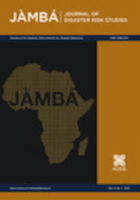
Jamba-Journal of Disaster Risk Studies
Scope & Guideline
Navigating Risks, Shaping Safer Futures.
Introduction
Aims and Scopes
- Disaster Risk Reduction and Management:
The journal emphasizes research on strategies and frameworks for effective disaster risk reduction, focusing on community involvement and institutional collaboration. - Resilience and Vulnerability Assessment:
A core area of focus is the assessment of community resilience and vulnerability to disasters, particularly in the context of climate change and socio-economic factors. - Policy and Governance in Disaster Management:
The journal explores the role of policies and governance structures in disaster risk management, emphasizing the need for coherent and inclusive frameworks. - Community-Based Approaches:
Research highlighting the importance of local knowledge, cultural practices, and community engagement in disaster preparedness and response is a significant aspect of the journal. - Climate Change and Environmental Risks:
The journal addresses the intersections of climate change impacts and disaster risks, focusing on adaptive strategies and sustainable practices.
Trending and Emerging
- Community Engagement and Local Leadership:
Papers increasingly highlight the role of local actors and community involvement in disaster risk reduction, indicating a shift towards participatory approaches that empower communities. - Impact of COVID-19 on Disaster Preparedness:
The COVID-19 pandemic has emerged as a significant theme, with research exploring its effects on disaster preparedness, community resilience, and the intersection of health and disaster management. - Adaptive Capacity and Resilience Building:
There is a growing emphasis on adaptive capacity as a critical component of resilience, with studies focusing on how communities can enhance their ability to cope with and recover from disasters. - Integration of Technology in Disaster Management:
Emerging research explores the use of technology, including social media and geospatial tools, for improving disaster communication, awareness, and management strategies. - Interdisciplinary Approaches to Disaster Risks:
The journal is increasingly featuring interdisciplinary research that combines insights from social sciences, environmental studies, and health sciences to address complex disaster risk scenarios.
Declining or Waning
- Traditional Disaster Response Models:
There is a noticeable reduction in papers focusing solely on traditional disaster response models, as the field shifts towards more integrated and holistic approaches that consider community resilience and adaptive capacity. - Single-Dimensional Risk Assessments:
Research that solely examines single dimensions of risk (such as solely environmental or social factors) has decreased, indicating a growing recognition of the need for multi-hazard and interdisciplinary assessments. - Generalized Climate Change Discussions:
While climate change remains a critical theme, discussions that do not connect climate impacts to specific disaster risk scenarios or community responses have become less frequent. - Urban Disaster Management Practices:
The focus on urban disaster management practices appears to be declining, potentially due to an increasing emphasis on rural and community-based approaches, as well as the recognition of informal settlements' unique challenges.
Similar Journals

Buildings
Pioneering Research at the Intersection of Architecture and EngineeringBuildings is a premier peer-reviewed journal published by MDPI, focusing on the multidisciplinary aspects of architectural and civil engineering. Established in 2011, this Open Access journal has quickly gained recognition in the academic community and is currently classified in the Q1 category for Architecture and Q2 for Building and Construction, as well as Civil and Structural Engineering, reflecting its significant impact within these fields. With Scopus rankings placing it in the top tier of architecture and construction disciplines, Buildings provides a platform for innovative research and practical applications that push the boundaries of knowledge in building design, sustainability, and infrastructure development. The journal, based in Switzerland and intended for an international audience, welcomes various types of content including research articles, reviews, and case studies, ensuring a comprehensive resource for researchers, professionals, and students alike.
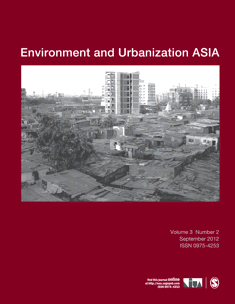
Environment and Urbanization ASIA
Advancing Knowledge for Sustainable Urban FuturesEnvironment and Urbanization ASIA is a leading academic journal published by SAGE Publications Ltd, focusing on the interplay between urbanization and environmental change across Asia. With an ISSN of 0975-4253 and E-ISSN 0976-3546, this peer-reviewed journal has established itself as an essential resource for scholars and practitioners alike, contributing significantly to the field of urban studies. Ranked in the Q1 category for Urban Studies in 2023 and positioned at 93rd out of 279 in Scopus, it reflects a robust percentile ranking of 66%, underscoring its impact and relevance. Published on a biannual basis, Environment and Urbanization ASIA aims to foster interdisciplinary dialogue and disseminate cutting-edge research that explores the complex dynamics of urbanization, sustainability, and environmental governance. Though it currently does not offer open-access options, its wealth of scholarly articles offers invaluable insights, making it a cornerstone for anyone engaged in addressing the challenges facing rapidly urbanizing regions in Asia. Join the community of researchers, professionals, and students dedicated to exploring innovative solutions in this critical area of study.
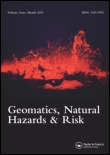
Geomatics Natural Hazards & Risk
Bridging Disciplines for Effective Risk AssessmentGeomatics Natural Hazards & Risk, published by TAYLOR & FRANCIS LTD, is a premier open-access journal that has been at the forefront of interdisciplinary research since 2010, addressing critical issues related to natural hazards and environmental risk management. With an impressive impact factor and ranking in the Q1 quartile in both Earth and Planetary Sciences and Environmental Science categories, this journal serves as a vital platform for researchers, professionals, and students dedicated to advancing knowledge in these fields. The journal's commitment to open access since 2016 ensures that its high-quality research is readily available to a global audience, fostering collaboration and innovation. Located in the United Kingdom, Geomatics Natural Hazards & Risk encompasses a broad scope of studies including geospatial technologies, risk assessment methodologies, and the societal impacts of natural disasters, making it an essential resource for anyone involved in the investigation and mitigation of natural hazards.

Journal of Regional and City Planning
Fostering sustainable development through collaborative research.Journal of Regional and City Planning, published by ITB JOURNAL PUBL, is a pivotal platform dedicated to advancing research in the fields of urban studies, geography, and development. Established in Indonesia, this esteemed journal (ISSN: 2502-6429) serves as an integrative forum for scholars, professionals, and students to explore the complex dynamics of regional and city planning within the context of rapidly changing urban environments. With a commendable Scopus ranking that places it in the Q3 category for Development and Geography and Q2 for Urban Studies, the journal emphasizes quality scholarship aimed at informing policy and practice between 2017 and 2024. Although currently not available in open access, it maintains a solid reputation for its rigorous peer-reviewed articles that contribute significantly to the academic discourse and practical frameworks in urban and regional development. Its commitment to fostering dialogue on sustainable development makes it a vital resource for anyone involved in planning and policy-making.
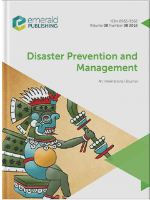
Disaster Prevention and Management
Transforming theory into practice for disaster prevention.Disaster Prevention and Management, published by Emerald Group Publishing Ltd, is a leading journal in the fields of disaster management, public health, and environmental policy. With an ISSN of 0965-3562 and an E-ISSN of 1758-6100, this journal has made significant contributions to both theoretical and practical advancements since its inception in 1992. Operating from the United Kingdom, it holds a Q2 ranking across various categories, including Business, Management and Accounting, Health (Social Science), and Public Health, reflecting its pivotal role in academic discourse and policy formulation. By engaging with contemporary issues related to disaster risk reduction, emergency preparedness, and resilience strategies, Disaster Prevention and Management aims to foster a multidisciplinary approach, making it a vital resource for researchers, practitioners, and students seeking to navigate the complexities of disaster scenarios effectively. With an impressive Scopus ranking across multiple categories, researchers are encouraged to explore its diverse range of articles and reports available for their academic and professional endeavors.
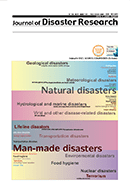
Journal of Disaster Research
Pioneering solutions for a safer, more resilient future.Journal of Disaster Research, published by FUJI TECHNOLOGY PRESS LTD, is a prominent Open Access journal that has been disseminating critical research on disaster management since its inception in 2007. Focusing on the interrelated fields of engineering and safety, the journal aims to advance knowledge and policy in disaster risk reduction, response, and resilience, making it an essential resource for researchers, practitioners, and policymakers alike. With an ISSN of 1881-2473 and E-ISSN 1883-8030, the journal covers a wide range of topics related to disaster studies, ensuring the dissemination of innovative solutions and diverse perspectives. Situated in Japan, the journal has been ranked Q3 in both Engineering (Miscellaneous) and Safety, Risk, Reliability, and Quality categories, showcasing its commitment to quality scholarship. As it converges its research contributions from 2006 to 2024, the Journal of Disaster Research continues to serve as a vital platform for advancing the science and practice of disaster research, thereby enhancing societal resilience against crises.
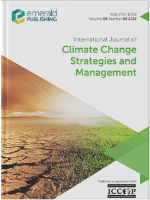
International Journal of Climate Change Strategies and Management
Advancing innovative solutions for a sustainable future.Introducing the International Journal of Climate Change Strategies and Management, a premier publication dedicated to advancing the understanding and development of innovative strategies addressing climate change. Published by Emerald Group Publishing Ltd in the United Kingdom, this journal has established itself as a trusted source within the realms of development, geography, and environmental science. With an impressive 2023 impact factor reflecting its high citation rates and a Q1 classification in pivotal categories such as Development and Geography, the journal stands at the forefront of climate change discourse. Since adopting an Open Access model in 2018, it has broadened its reach, making cutting-edge research accessible to a global audience. The journal encompasses a wide array of topics essential for academics and practitioners alike, focusing on management, policy-making, and methods for effective monitoring of environmental strategies. By fostering interdisciplinary dialogue, the International Journal of Climate Change Strategies and Management is essential for those aiming to contribute to sustainable solutions in our rapidly changing world.
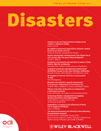
DISASTERS
Transforming disaster understanding through academic collaboration.DISASTERS, published by WILEY, is a premier academic journal dedicated to advancing the understanding of disasters across multiple disciplines, including Earth and Planetary Sciences and Social Sciences. With a historical publication span from 1977 to 2024, this journal has established itself as a vital resource within the academic community, boasting a Q1 category ranking in both fields, indicating its high impact and relevance. DISASTERS ranks impressively in Scopus, holding the #27 position in General Social Sciences and #36 in General Earth and Planetary Sciences, reflecting its influence in shaping disaster research and policy. The journal serves as a platform for interdisciplinary collaboration, offering researchers, professionals, and students critical insights into disaster management, response strategies, and risk reduction measures. Although it is not an Open Access journal, DISASTERS remains a cornerstone for those looking to contribute to and stay informed about the evolving landscape of disaster studies.

Journal of Safety Science and Resilience
Navigating the complexities of safety with expert analysis.Welcome to the Journal of Safety Science and Resilience, a pioneering platform dedicated to advancing knowledge in the fields of safety, risk, reliability, and quality. Published by KEAI PUBLISHING LTD and based in China, this Open Access journal has made significant strides since its inception in 2020. With an impressive impact factor and a distinguished Q1 ranking in various categories, including Safety Research and Safety, Risk, Reliability and Quality, it serves as an authoritative resource for researchers, professionals, and students alike. The journal's commitment to disseminating high-quality research is reflected in its exceptional Scopus rankings, with top positions in decision sciences and social sciences. As we converge into the future with volumes planned up to 2024, engaging contributions focused on contemporary challenges and innovations in safety science are more essential than ever. Explore groundbreaking studies and elevate your understanding of resilience in the face of uncertainty through this invaluable academic resource.
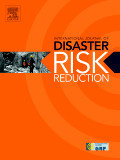
International Journal of Disaster Risk Reduction
Shaping best practices in disaster preparedness and governance.The International Journal of Disaster Risk Reduction is a leading academic publication dedicated to advancing the understanding and management of disaster risks, promoting innovative solutions and effective strategies for risk reduction. Published by ELSEVIER, this journal serves as a critical platform for researchers, professionals, and students in the fields of Geology, Geotechnical Engineering, and Safety Research. With an impressive impact factor and ranked in the top quartile (Q1) across its various categories as of 2023, it demonstrates exceptional quality and relevance in its contributions to science and engineering disciplines. The journal has been committed to disseminating high-quality research since its inception in 2012 and remains open for new submissions through 2024. The Scopus rankings reflect its prestigious position, with notable placements in Earth and Planetary Sciences and Social Sciences, highlighting its influence in shaping best practices for disaster risk governance. As an essential resource for anyone involved in disaster preparedness and mitigation, the International Journal of Disaster Risk Reduction fosters knowledge exchange and collaboration among stakeholders in the global community.